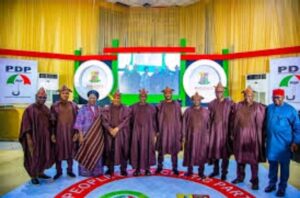PDP Power Struggle Escalates: Governors Seek to Oust Wike, While Anyanwu Claims Unfair Treatment

The crisis within the Peoples Democratic Party (PDP) escalated recently when governors who belong to the party convened with members of the National Working Committee (NWC) in Ibadan to call for urgent action regarding the ongoing leadership conflict. They demanded the removal of Senator Samuel Anyanwu, who claims the position of National Secretary, citing a Court of Appeal ruling that recognized Sunday Ude-Okoye as the legitimate officeholder. Additionally, the governors requested the postponement of the party’s National Executive Committee (NEC) meeting to March 13, 2025, accusing the current leadership of hindering crucial decisions that might resolve the dispute.
This intensified challenge against Anyanwu arises from increasing dissatisfaction among party leaders concerning the significant yet contentious influence of Nyesom Wike, the Minister of the Federal Capital Territory and former Rivers State governor, who remains a prominent player in PDP’s internal affairs. Anyanwu, viewed as an ally of Wike, dismissed the governors’ stance and the NWC’s position, asserting his legitimacy as National Secretary based on a restraining order from the Court of Appeal, which requires maintaining the status quo until his appeal is resolved at the Supreme Court. He characterized the governors’ communiqué as a provocation and an “invitation to anarchy,” accusing them of inciting turmoil within the party for their political gain.
In a surprising development, Anyanwu also filed a complaint with the Inspector General of Police, alleging that the governors’ actions jeopardize public peace and breach the rule of law. Meanwhile, the PDP’s disciplinary committee, led by Tom Ikimi, has convened Anyanwu and other party members to address various petitions. The party’s Board of Trustees (BoT) has aligned with the court ruling by instructing the NWC to promptly appoint Ude-Okoye. These events signify an intensifying internal struggle for control over the PDP, with factions vying for power ahead of critical political decisions leading up to the 2027 general elections.
As the crisis progresses, the party’s capacity to present a united front against the ruling All Progressives Congress (APC) appears increasingly compromised. The contention over who oversees the PDP’s national secretariat may seem procedural but underscores deeper ideological and strategic disputes regarding the party’s future direction. With both sides unwilling to compromise and legal disputes escalating in court, the PDP finds itself at a crucial turning point in its political journey. The outcome of this leadership conflict could determine whether the party evolves into a more robust and cohesive entity or succumbs to the internal fractures that have plagued it since the 2015 general elections.






